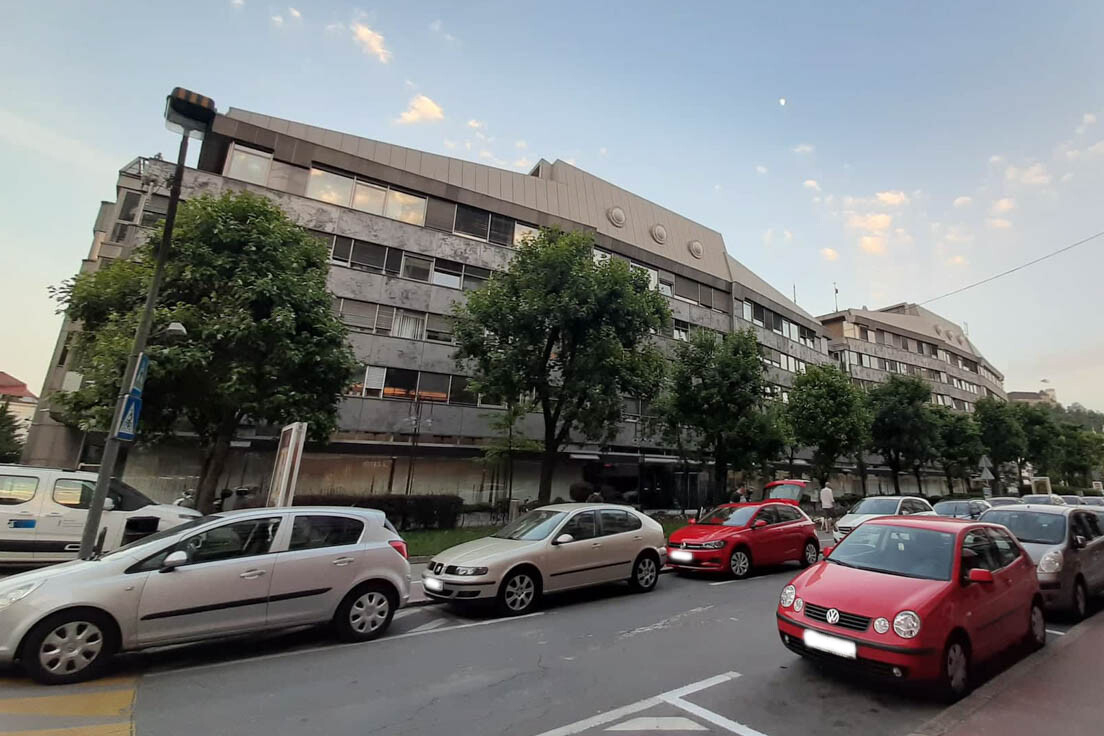Employees of Slovenia’s public broadcaster RTV Slovenija staged a one-hour strike on Monday against management, demanding greater journalistic and editorial autonomy, and an end to the politicisation of public media.
“We are not striking against the public or against the government. We are striking against the management of RTV”, wrote members of the RTV SLO editorial board who gathered in front of the public broadcaster’s headquarters in the capital city, Ljubljana, and regional centres in Koper and Maribor on 23 May. They described the situation at RTV SLO as “unbearable”, placing blame for declining TV ratings and public confidence in the organisation on the “harmful moves of the leadership.”
Ob 13.15 se je pred RTV Slovenija začel zbor zaposlenih in hkrati novinarska konferenca stavkovnega odbora, ki je predstavil svoje zahteve. “Nismo samo novinarji, smo tudi tajnice režije, režiserji, snemalci, produkcija, grafiki in ostala ekipa.”
➡ https://t.co/jjHdf0MSV4 pic.twitter.com/xmLGing1dw
— 📱MMC RTV Slovenija (@rtvslo) May 23, 2022
The key demands of the strike include full editorial independence, an adherence to professional, programmatic, and ethical standards; negotiations on increasing minimum wage; social dialogue, and a paid strike.
They warned that if these demands were not addressed by 30 May, they would call for the resignation of RTV SLO Director General, Andrej Grah Whatmough, Programme Council President, Petar Gregorčič, and two other senior executives.
Read more: RTV Slovenija staff on strike: We’re fighting for public media
How did it get to this?
Financial and editorial pressures on public media and other independent, critical voices in Slovenia have escalated in recent years.
In July 2021, the Global Task Force for public media, a working group of eight public media organisations standing together to promote and defend the values of public media, issued a statement expressing their concerns for “further evidence of sustained and destabilising pressure on public media in Slovenia”, which was revealed in a report published by partners of the Media Freedom Rapid Response (MFRR) group.
Meanwhile, the RTV SLO Programme Council approved a significant news programming shake-up in November 2021, which included cancelling several talk shows and shortening various news programmes. The plan was met with widespread criticism from civil society organisations, international media advocacy organisations, local journalists’ associations, and regional press councils, who argued that such changes would undermine the public broadcaster’s core mission to provide citizens with professional and informative reporting.
Another key area of concern includes a plan to create two separate news programmes – what RTV SLO employees perceive as an attempt to create pro-government and pro-opposition news programmes. In their press release, striking employees reiterated: “We are on strike because we do not agree that the business and programme management divides us into left and right journalists, and the editorial board is politically split on the left and right. We are on strike because we want to work according to professional and ethical rules, according to our professional conscience.”
Most recently, journalists’ union Sindikat Novinarjev Slovenike (SNS) accused the RTV SLO Programming Council of adopting measures that would restrict trade union activity and freedom of expression.
There have also been announcements made by the emerging coalition government (Freedom Movement, Social Democrats (SD) and Left) and opposition parties to amend the law on RTV Slovenija. While the opposition, conservative Democrats (SDS, former populist President Janez Jansa’s party) are calling for the public broadcaster’s licence fee to be made voluntary, coalition parties believe that this is an attempt to undermine RTV SLO’s finances. Instead, they suggest that the legislation should be amended to depoliticise the broadcaster and ensure editorial autonomy.
Striking employees, who received support from various trade union and journalist groups, warned that Monday’s demonstration would not be the end of their efforts to improve working conditions and journalistic standards at RTV SLO.
However, “the Slovenian Association of Journalists and Commentators (ZNP) considers the strike unnecessary and the demands for the resignations unjustified”, The Slovenia Times reported.
It is hoped that the formation of a new coalition government will result in a more favourable environment for independent public service media in Slovenia. The Public Media Alliance and its partners will continue to observe the situation with the hope that words of support for depoliticisation and protected independence are actioned.
Header image: Building of RTV Slovenia (Television’s part). Credit: Pv21/Creative Commons
Related Posts
23rd March 2022
RTV Slovenija’s Programming Council accused of restricting union activity
A Slovenian journalists’ union has…
6th January 2022
RTV Slovenija: Draft transformation bill and new appointments
A small group of RTV Slovenija (RTVS)…
30th November 2021
Explainer: RTV SLO programming shake-up criticised
The 2022 programme production plan for…
6th July 2021
Global Task Force statement in support of public media in Slovenia
The Global Task Force for public media…

